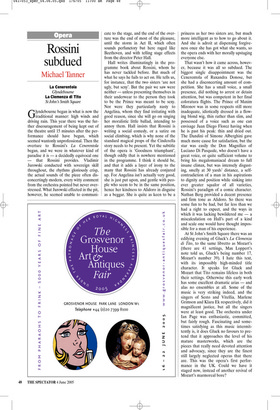Rossini subdued
Michael Tanner
La Cenerentola Glyndebourne La Clemenza di Tito St John’s Smith Square Glyndebourne began in what is now the traditional manner: high winds and driving rain. This year there was the further discouragement of being kept out of the theatre until 15 minutes after the performance should have begun, which seemed wantonly unprofessional. Then the overture to Rossini’s La Cenerentola began, and we were in whatever kind of paradise it is — a decidedly equivocal one — that Rossini provides. Vladimir Jurowski conducted with sovereign skill throughout, the rhythms gloriously crisp, the actual sounds of the piece often disconcertingly modern, every witty comment from the orchestra pointed but never overstressed. What Jurowski effected in the pit, however, he seemed unable to communi cate to the stage, and the end of the overture was the end of most of the pleasure, until the storm in Act II, which often sounds perfunctory but here raged like Beethoven, and with telling stage effects from the director Peter Hall.
Hall writes illuminatingly in the programme book about Rossini, whom he has never tackled before. But much of what he says he fails to act on. He tells us, for instance, that the two sisters ‘are not ugly, but sexy’. But the pair we saw were neither — unless presenting themselves in their underwear to the person they took to be the Prince was meant to be sexy. Nor were they particularly nasty to Angelina, whom they find irritating with good reason, since she will go on singing her moralistic little ballad, intending to annoy them. Hall insists that Rossini is writing a social comedy, or a satire on social climbing, which is why none of the standard magical props of the Cinderella story needs to be present. Yet the subtitle of the opera is ‘Goodness triumphant’, though oddly that is nowhere mentioned in the programme. I think it should be, and that it adds a layer of irony to the many that Rossini has already conjured up. For Angelina isn’t actually very good, she is just put upon, and gentle with people who seem to be in the same position, hence her kindness to Alidoro in disguise as a beggar. She is quite as keen to be a princess as her two sisters are, but much more intelligent as to how to go about it. And she is adroit at dispensing forgiveness once she has got what she wants, so the opera ends with her morally upstaging everyone else.
That wasn’t how it came across, however, because it was all so subdued. The biggest single disappointment was the Cenerentola of Ruxandra Donose, but she had a disconcerting amount of competition. She has a small voice, a small presence, did nothing to arrest or detain attention, but was competent in her final coloratura flights. The Prince of Maxim Mironov was in some respects still more inadequate, idiotically dressed in a flowing blond wig, thin rather than slim, and possessed of a voice such as one can envisage Juan Diego Florez having when he is past his peak: thin and dried out. The Dandini of Simone Alberghini gave much more cause for satisfaction, but the star was easily the Don Magnifico of Luciano Di Pasquale, who doesn’t have a great voice, or quite sufficient volume to bring his megalomaniacal dream to full insane climax, but was intensely disgusting, smelly at 30 yards’ distance, a selfcontradiction of a man in his aspirations to dignity and position while sinking into ever greater squalor of all varieties, Rossini’s paradigm of a comic character. Nathan Berg provided a decent presence and firm tone as Alidoro. So there was some fun to be had, but far less than we had a right to expect, and the ways in which it was lacking bewildered me — a miscalculation on Hall’s part of a kind and scale one would have thought impossible for a man of his experience.
At St John’s Smith Square there was an edifying evening of Gluck’s La Clemenza di Tito, to the same libretto as Mozart’s (there are 41 settings, Max Loppert’s note told us, Gluck’s being number 17, Mozart’s number 39). I hate this text, with its impossibly high-minded title character. It speaks for Gluck and Mozart that Tito remains lifeless in both their settings. Otherwise this early work has some excellent dramatic arias — and alas no ensembles at all. Some of the music is very striking indeed, and the singers of Sesto and Vitellia, Marlene Grimson and Klara Ek respectively, did it magnificent justice, but all the singers were at least good. The orchestra under Ian Page was enthusiastic, committed, but fairly rough. Fascinating and sometimes satisfying as this music intermittently is, it does Gluck no favours to pretend that it approaches the level of his mature masterworks, which are the pieces that really need devoted attention and advocacy, since they are the finest still largely neglected operas that there are. This was the opera’s first performance in the UK. Could we have it staged now, instead of another revival of Mozart’s marmoreal bore?


















































 Previous page
Previous page